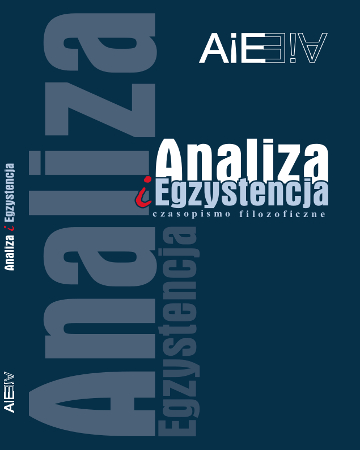
ISSN: 1734-9923
eISSN: 2300-7621
OAI
DOI: 10.18276/aie.2015.31-02






Issue archive /
31 (2015)
Continuous creation in the probabilistic world of the theology of Chance
| Authors: |
Dariusz
Łukasiewicz
Kazimierz Wielki University in Bydgoszcz, Poland |
| Keywords: | God, continuous creation, substance, concurrentism, occasionalism ciągłe stwarzanie, Bóg, konkurentyzm, okazjonalizm, substancja |
| Data publikacji całości: | 2015 |
| Page range: | 15 (21-35) |
Abstract
The aim of the paper is to present and analyze the doctrine of continuous creation typical for theism. Continuous creation is conceived of as divine causal action consisting in God’s bringing about the existence of any being at every moment of its existence. Such a definition of divine action, as N. Malebranche argued, leads to occasionalism – that is, to the view that God is the only cause in the world. In the first part of the paper, an attempt is made to demonstrate that Malebranche’s conclusion is valid and that two alternative views, weak and strong concurrentism, are not tenable. In the second part of the article, the idea of continuous creation is discussed, which can be formulated from the point of view of probabilistic theism.
Download file
Article file
Bibliography
| 1. | Bartholomew D.J. (1984), God of Chance, Tottenham/London: SCM Press Ltd. Bartholomew D.J. (2008), God, Chance and Purpose. Can God have It Both Ways?,Oxford: Oxford University Press. |
| 2. | Craig W.L. (1998), Creation and Conservation Once More, “Religious Studies” 34, pp. 177–88. |
| 3. | Freddoso A.J. (1991), God’s General Concurrence with Secondary Causes: Why Conservation is not Enough, [in:] J.E. Tomberlin (ed.), Philosophical Perspec- tives, vol. 5, Philosophy of Religion, Atascadero, CA: Ridgeview Publishing, pp. 553–85. |
| 4. | Hartshorne C. (1984), Omnipotence and other Theological Mistakes, New York: SUNY Press. |
| 5. | Haught J.F. (2007), Darwin, Design, and Divine Providence, [in:] W. Dembski, Michael Ruse (ed.), Debating Design. From Darwin to DNA, Cambridge: Cambridge University Press., pp. 229–245. |
| 6. | Heller M. (2011), (Philosophy of Chance) Filozofia przypadku. Kosmiczna fuga z preludium i codą, Kraków: Copernicus Center Press. |
| 7. | Loux M. (2002), Metaphysics. A contemporary Introduction, Second Edition, New York: Routledge. |
| 8. | Łukasiewicz D. (2014), Opatrzność Boża, wolność, przypadek. Studium z analitycznej filozofii religii, Kraków–Poznań: Fundacja Dominikańskie Studium Filozofii i Teologii, str. 410 |
| 9. | Łukasiewicz E. (2006), What kind of System is language? – On the Relavance of Genaral Systems Theory to Language Studies, “Scripta Neophilologica Po- snaniensia”, pp. 97–113. |
| 10. | McCann H.J. (2005), Divine Power and Action, [in]: W.A. Mann (ed.), Philosophy of Religion, Malden: Blackwell Publishing Ltd, pp. 26–47. |
| 11. | Kvanvig J.L., McCann H.J. (1988), Divine Conservation and the Persistence of the World, “Morris”, pp. 13–49. |
| 12. | Miller T.D. (2007), Continuous creation, persistence and secondary causation: and essay on the metaphysics of theism, [Unpublished dissertation]. |
| 13. | Morris T.V. (ed.) (1988), Divine and Human Action: Essays in the Metaphysics of Theism, Ithaca: Cornell University Press. |
| 14. | Polkinghorne J.C. (2007), The Inbuilt Potentiality of Creation, [in:] W. Dembski, M. Ruse (ed.), Debating Design. From Darwin to DNA, Cambridge: Cambridge University Press, pp. 246–260. |
| 15. | Quinn P. (1983), Divine Conservation, Continuous Creation, and Human Action [in:] A.J. Freddoso (ed.), The Existence and Nature of God, Notre Dame, IN: University of Notre Dame Press, pp. 55–79. |
| 16. | Quinn P. (1988), Divine Conservation, Secondary Causes, and Occasionalism, “Morris”, pp. 50–73. |
| 17. | Quinn P. (1993), Creation, Conservation, and the Big Bang, [in:] J. Earman (ed.), Philosophical Problems of the Internal and External Worlds: Essays on the Philosophy of Adolpf Grünbaum, Pittsburgh: University of Pittsburgh Press, pp. 589–612. |
| 18. | Van Inwagen P. (1988), The Place of Chance in a World Sustained by God, “Morris” pp. 211–35. |